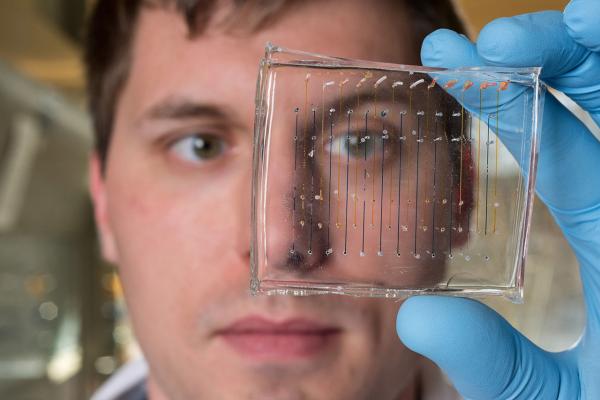Using tiny snippets of DNA as “barcodes,” researchers have developed a new technique for rapidly screening nanoparticles for their ability to selectively deliver therapeutic genes to specific organs of the body. The technique could accelerate the use of gene therapies for such killers as heart disease, cancer, and Parkinson’s disease.
Genetic therapies, such as those made from DNA or RNA, are difficult to deliver into the right cells in the body. For the past 20 years, scientists have been developing nanoparticles made from a broad range of materials and adding compounds such as cholesterol to help carry these therapeutic agents into cells. But the nanoparticle carriers must undergo time-consuming testing — first in cell culture, then in animals. With millions of possible formulas, identifying the optimal nanoparticle to target each organ has been challenging.
Using DNA strands just 58 nucleotides long, researchers from Georgia Tech, the University of Florida, and the Massachusetts Institute of Technology (MIT) have developed a new evaluation technique that skips the cell culture testing altogether — and could allow hundreds of different types of nanoparticles to be tested simultaneously in just a handful of animals.
Media Contact
Keywords
Latest BME News
Jo honored for his impact on science and mentorship
The department rises to the top in biomedical engineering programs for undergraduate education.
Commercialization program in Coulter BME announces project teams who will receive support to get their research to market.
Courses in the Wallace H. Coulter Department of Biomedical Engineering are being reformatted to incorporate AI and machine learning so students are prepared for a data-driven biotech sector.
Influenced by her mother's journey in engineering, Sriya Surapaneni hopes to inspire other young women in the field.
Coulter BME Professor Earns Tenure, Eyes Future of Innovation in Health and Medicine
The grant will fund the development of cutting-edge technology that could detect colorectal cancer through a simple breath test
The surgical support device landed Coulter BME its 4th consecutive win for the College of Engineering competition.








